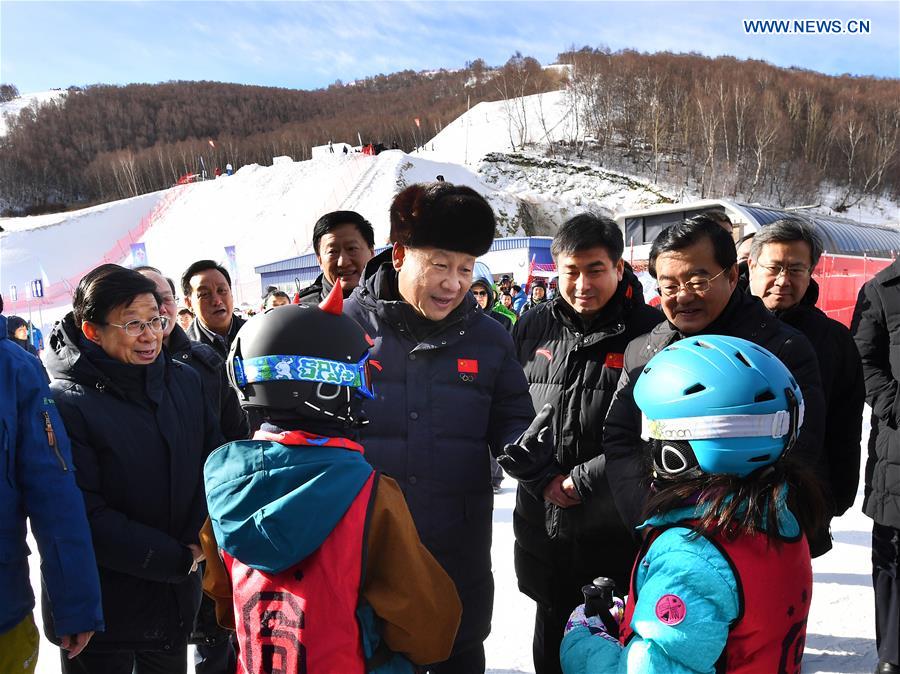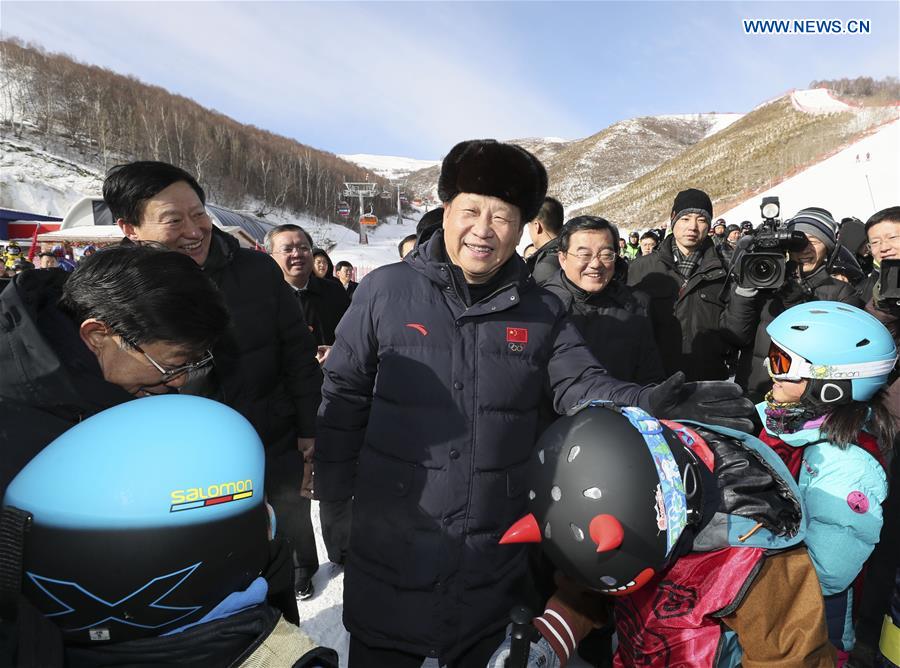On January 23, 2017, President Xi Jinping inspected the preparations for the 2022 Beijing Winter Olympics in Zhangjiakou, Hebei Province. He said it was a state event and China would host the Games in a green and clean manner.

President Xi Jinping encourages children attending skiing winter camps at Genting Ski Resort as he inspects preparatory work for Beijing 2022 Winter Olympic Games in Zhangjiakou City, North China's Hebei Province, Jan. 23, 2017. (Photo: Xinhua)
During the inspection in Genting Ski Resort in Chongli, Xi communicated with some ski enthusiasts who were practicing and asked about their skiing experience. Among a group of children who were participating in a ski winter camp, Xi leaned over and asked them how old they were, where they came from and whether it was difficult to practice skiing. He encouraged them to study hard, grow up healthily, stay brave and be careful.
Xi visited the athletes of the national ski team who are training in the resort. He encouraged them to train hard to enhance their technical skills and strive to win glory for the country.
Xi also expected great efforts to be exerted to attract more people to participate in winter sports and promote the nationwide fitness program.
"Golden season" in Chongli
As the mountains were blanketed in snow, Zhangjiakou's Chongli County embraced its peak season. Ski lovers indulged in the speed and experienced the passion and joy of ice and snow sports.
Chongli has been called "the most ideal natural skiing site in North China," where many snow games for the 2022 Beijing Winter Olympics will be held. Xi visited the site twice -- on January 23, 2017 and January 19, 2021 -- to learn about preparations for the Winter Olympics and Paralympics.
He pointed out that the foundation of building a sporting powerhouse lies in mass-participation sports and China's hosting of the Games should entail a higher national level of winter sports, especially snow sports.
He also pledged to get 300 million Chinese people involved in winter sports. The number of tourists going to Genting Ski Resort has doubled in four years.
"Have you found magic in skiing?"
"President Xi is amiable, and the questions he asked are both meticulous and professional," said Zhang Yan, the head of the Magic Ski Academy in Chongli recalling Xi's inspection.
At that time, Zhang and his coaches were taking the children to train in the practice area.
"The children's costumes were filled with cartoon characteristics, with horns on the helmets. Perhaps this is what attracted President Xi's attention. He waved to everyone and walked towards the children."

President Xi Jinping encourages children attending skiing winter camps at Genting Ski Resort in Zhangjiakou, Hebei Province, Jan. 23, 2017. (Photo: Xinhua)
The children gathered in excitement. Xi bent down and exchanged with them enthusiastically. Seeing the words "Magic Ski Academy" written on the snow suits, Xi quipped, "Have you found magic in skiing?"
Zhang said he noticed that Xi's eyes were full of care when he looked at the children. Xi asked how long the winter camp was, how much it charged, and what they could learn. He specifically urged that safety be guaranteed.
Zhang 's ski academy has been expanding in Beijing and Chongli, and has also opened for indoor skiing in Shanghai and Suzhou where children of the south can experience the fun of ice and snow sports. "There are more young people participating in ice and snow sports, and the future of ice and snow will definitely be better," said Zhang.
China's ice and snow sports industry expected to grow
"I was busy distributing goods for the ski team at the time. The store door was pushed open and I looked up. 'Isn't that President Xi?'"
At that time in 2017, Tan Shuwen was a sales staff member at a ski shop. Xi came to the shop to ask about the price, origin and function of helmets, snow goggles, snow suits, and snowboards.
"He was particularly concerned about domestic brands. When he saw that a ski suit was a Chinese brand, President Xi smiled and nodded."
Before going out, Xi also asked about the business in the store.
Tan Shuwen said, "It is getting better and better."
Hearing this, Xi smiled and said, "Ice and snow sports have developed."
As an employee in the ice and snow industry, Zhao Qiong felt that Xi not only paid great attention to ice and snow sports, but also hoped that China's ice and snow sports industry would continue to grow and develop.
The number of people skiing in Chongli has soared, leading to improved links in the ice and snow sports industrial chain including ski resort construction, ski equipment sales, teaching training, ice and snow tourism, hotels and restaurants.
"From 2017 to the present, the output of ski suits has increased by more than 10 percent annually," said Liu Zonglin, founder of Zhangjiakou Zhishan Sporting Goods Company.
Chongli's first ski resort opened in 1996. Lu Yongshuai was at elementary school. He followed his grandfather stepping into knee-high snow, walking over the mountains and ridges all morning, just to "see something new."
Today he is a senior coach at the resort. He bought a house and a car with an annual income of more than 100,000 yuan.
"If my daughter wants to ski, I can drive her here," Lu said.
According to official statistics, Chongli has a population of 126,000, and more than 30,000 are engaged in ice and snow industries. One out of every four people depends on ice and snow sports.
Chongli, previously unknown, has now built seven ski resorts and has received more than 1 million skiers.
From 2013 to 2018, the total number of sports venues across the country grew at an average annual rate of 17.3 percent, striving to meet the people's growing sports and fitness needs.
The total number of participants exceeded 100 million, and the proportion of urban residents who participated in mass sports events or exhibition activities reached 56.2 percent and rural residents 59.4 percent.
(Translated by Luo Meiqi, Edited by Huan Jingjing)


